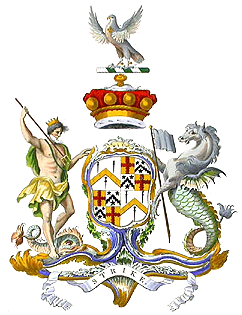This article needs additional citations for verification. (November 2021) |

Baron Hawke, "of Towton" in the County of York, is a title in the Peerage of Great Britain. It was created on 20 May 1776 for Admiral Sir Edward Hawke (of Scarthingwell Hall in the parish of Towton), responsible for a blockade of all French merchant shipping and the grounding of six French ships, and scattering of the rest, at the Battle of Quiberon Bay. The battle followed an earlier British victory at the Battle of Lagos off the coast of Portugal by a fleet under another admiral's command.
The year, 1759, was dubbed for Britain its Annus Mirabilis, or 'miracle year', as France could not follow up on clear victory in the Battle of Sainte-Foy just before the Siege of Quebec for want of reinforcements and supplies from France, and its crippled trade triggered a credit crunch. Hawke's naval conduct then and later as Lord Admiral proved to establish British naval supremacy and in the immediate term determined the fate of New France and hence Canada.[1]
His son, the second Baron, represented Saltash in the House of Commons for the six years until his father died. His son, the third Baron, assumed the additional surname of Harvey. The fifth Baron succeeded his elder brother in 1869 and in the next year was succeeded by his first cousin, the sixth Baron. He was the son of Hon. Martin Bladen Edward Hawke (Jnr). His son, the seventh Baron,[2] an exceptional cricketer, became the England cricket team captain. On his death the title passed to his younger brother, the eighth Baron. His elder son, the ninth Baron, was one of six to eight co-serving Lords whips in the third Churchill ministry and two following Conservative ministries until 1964. He was succeeded by his younger brother, the tenth Baron, whose son then became the 11th Baron on his death. As of 2017[update], the title is held by the 12th Baron, who succeeded his father in 2009.
The family seat is The Old Mill House, near Cuddington, Cheshire.
- ^ Syrett (ed.). The Royal Navy in European Waters During the American Revolutionary War. p. 59.
- ^ Hesilrige 1921, p. 461.